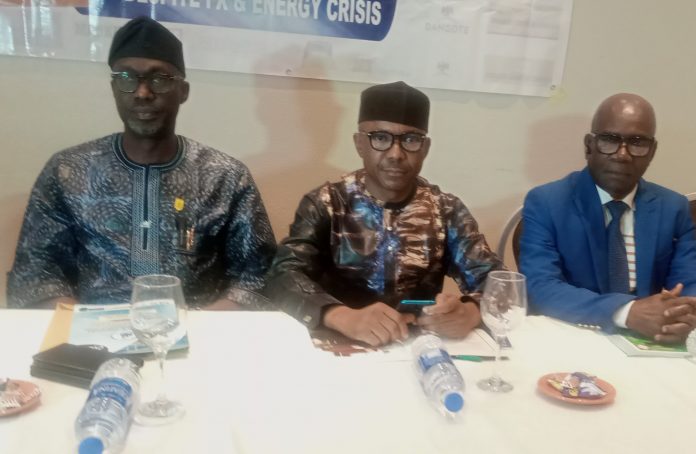Caption
From Left to Right: The MAN DG, Segun Ajayi-Kadir, The Chairman of CICAN, Charles Okonji and the Managing Director, Stellarchem Nigeria Ltd, Ikpong Umoh during the CICAN Conference last week in Lagos.
Manufacturers have been confronted with inclement operating environment that was compounded by the COVID-19 pandemic in 2020 down to the current Russian-Ukrainian war. The forex and energy crises are frontline manifestations.
The Director General of MAN, Segun Ajayi-Kadir, who was keynote Speaker at the 2022 CICAN Annual Workshop/Awards & Recognition, stated the above while speaking with the theme: Manufacturing: Despite FX & Energy Crisis.
The crises according to him are responsible for the unfavourable movements in manufacturing indicators such as capacity utilization, contribution to real GDP, investment, employment, cost of production and competitiveness.
“It is important therefore, that forex and energy, as well as other manufacturing challenges, are adequately addressed to arrest further degeneration in the performance of the sector. In doing that we consider the following measure critical such as allocation of significant proportion of available foreign exchange to the productive sector, particularly manufacturing, carrying out further investment in the electricity value chain and commit to adding 10000MW to the current electricity distributed in the country and embrace and support significant development of energy mix and renewables. The country has huge potentials for Solar and Wind”, he noted.
Going forward, the government should expand the scope of Road Infrastructure, Development and Refurbishment Investment Tax Credit Scheme, incentivization of investment in local development of raw materials and suspension of the 15% levy on imported wheat
“Address prevailing concerns of the beleaguered manufacturing sector by non-implementation of the planned increase in excise duty on non-alcoholic and alcoholic beverages, tobacco, wine and spirits as the increase is in violation of the roadmap set by Government itself for the period 2022-2024”, he noted.
“Already, this increase is negatively impacting the performance of the sector and further increase will bring it to its knees and lead to divestment and closures. Also the envisage revenue boost by government will not be realized”, he maintained.
“The manufacturing industries in the Harbour industrial sector in Onitsha that were devastated by the flood recently should be assisted to recover from their colossal loses and preventive measures taken to forestall future occurrences. The committees of the National Assembly that extend their oversight functions to manufacturing industries and require their CEOs to produce tons of documents and evidence of compliance that are readily available with the relevant statutory regulatory agencies should be stopped. This is an unnecessary burden, diversion and very expensive venture”, stressed the DG.

Ajayi-Kadir
Proffering solution to the challenges in the Real sector, he said, “Resuscitate the existing national refineries to produce fuels locally; review the gas price for domestic consumption to be in sync with export price, publish the list of approved harmonized taxes and levies for the manufacturing sector by the Joint Tax Board, JTB, to address the issues of multiples taxes and levies; Crafting of a national response and sustainability strategic plan to avert the looming economic crisis and shortages that would arise from the full impact of the Russian- Ukrainian war”.
“It was hoped that the recovery achieved In 2021 will be advanced in 2022, even though the effect of the pandemic lingered. However, the Russian invasion of Ukrainian in early 2022 dashed all economic projections for 2022 with negative impacts on supply chains, energy cost (cost diesel and gas), cost of agro-allied raw-materials (wheat, fertilizer and fertilizer inputs, etc), freight logistics, trade and global inflation. In particular, increase in cost of energy pushed up global inflation which affected the cost of importation across the world, including Nigeria”, he noted.
The DG further stated that with limited forex inflow from crude oil sales, forex demand pushed over the bounds of supply and contributed to the depreciation in Naira value. Manufacturing in Nigeria is heavily beset by these price developments and manufacturers are contending with these challenges while struggling to sustain production. Manufacturers are concerned about the increase in the cost of energy and acute shortage of forex and the ontinuous depreciation in the value of Naira.
The primary driving force for sustaining production according to him is the patriotism and resilience that the Nigerian manufacturers processes.
“The optimism that these challenges would eventually be addressed. Manufacturers have faith in the capacity of their Association, MAN, to engage Government and other stakeholders to ameliorate the challenges. Most manufacturers also embark on strategic measures to minimize the impact of the inclement operating environment on their activities such as: cost cutting, products selection and prioritization: some manufacturers have suspended the production of certain products to concentrate on more competitive ones; expanding their investment in the development and production of raw materials locally, even as MAN collaborates with RMRDC to optimize localization, increased resort to self-energy generation and energy mix to complement the inadequate electricity supply from the national grid and dissaving retained earnings to support the current crippling condition”.





















